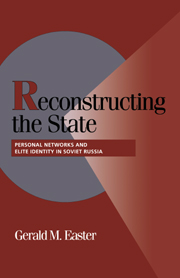Book contents
- Frontmatter
- Contents
- Preface
- 1 Introduction: Explaining State-Building Outcomes and the Soviet Russian Case
- Part I Structure and Identity in the Postrevolutionary State Elite
- 2 Anatomy of a Regional Elite: The Rise of the Provincial Komitetchiki
- 3 Constructing an Elite Identity: Images of Self, Service, and State
- Part II Informal Sources of Power in the Postrevolutionary State
- Part III Intrastate Conflict and the Constraints of Power Redefined
- Notes
- Bibliography
- Index
- Titles in the series
3 - Constructing an Elite Identity: Images of Self, Service, and State
Published online by Cambridge University Press: 13 October 2009
- Frontmatter
- Contents
- Preface
- 1 Introduction: Explaining State-Building Outcomes and the Soviet Russian Case
- Part I Structure and Identity in the Postrevolutionary State Elite
- 2 Anatomy of a Regional Elite: The Rise of the Provincial Komitetchiki
- 3 Constructing an Elite Identity: Images of Self, Service, and State
- Part II Informal Sources of Power in the Postrevolutionary State
- Part III Intrastate Conflict and the Constraints of Power Redefined
- Notes
- Bibliography
- Index
- Titles in the series
Summary
This chapter attempts to reconstruct the elite identity of the Provincial Komitetchiki. It presents common themes about self, service, and state expressed by the Provincial Komitetchiki at the time of their promotion to positions as regional leaders. In the words of Leopold Haimson, I seek to uncover “who they were in order to determine, how they should feel, think, and ultimately to act.” The elite identity of the Provincial Komitetchiki expressed the value culture of Russia's new radical socialist regime. The personal traits and experiences emphasized in this identity revealed the sources of elite status in the new state. On the basis of belonging to this intraparty status group, the Provincial Komitetchiki would make a claim on special privileges and powers conferred by the state.
In the postrevolutionary period, the sources of elite status of Russia's old regime had become discredited. Noble inheritance, familial lineage, bureaucratic position, and lavish lifestyle were no longer markers of elite status. Indeed, persons identified with these attributes were sometimes labeled class enemies and risked severe reprisals. The formal administrative structures of the tsarist state were in disarray and its formal elite structure, the table of ranks, was in disrepute. Nor was elite status conferred on the basis of the personal attributes common to other twentieth-century states, such as ethnicity, wealth, and merit.
- Type
- Chapter
- Information
- Reconstructing the StatePersonal Networks and Elite Identity in Soviet Russia, pp. 47 - 64Publisher: Cambridge University PressPrint publication year: 2000



